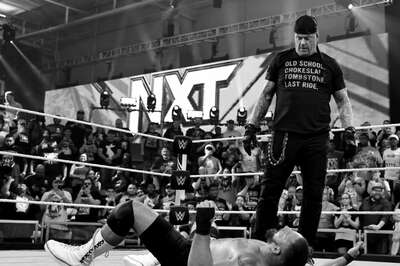
views
Social media networks are in the line of fire again. And with good reason. This time around, the burning issue is that Twitter and the Facebook owned Instagram have been unable to control the racism laden hate that has been directed at some footballers over the past few weeks. In the space of a few days, Chelsea’s Tammy Abraham, Reading’s Yakou Meite and Manchester United’s Paul Pogba were all targeted by anonymous social media users, with racism laden tweets. The players’ “fault”? All three players missed chances to score a goal from the penalty spot for their teams. Clearly, no one is impressed with what is happening, and it is good to see genuine fans stand up and be counted.
After Chelsea striker Tammy Abraham missed an opportunity to score a goal during the penalty shootout against Liverpool in the UEFA Super Cup, he was attacked by anonymous trolls on Twitter. When Yakou Meite missed a penalty in Reading's 3-0 win against Cardiff City, he was at the receiving end of the same treatment. And the next day, Manchester United’s Paul Pogba was the target of racist comments for his missed penalty in the club’s draw against Wolves. Neither club took this lying down.
“I am particularly disgusted by a so-called Chelsea fan… Somebody sitting behind a keyboard or a phone has said the most disgusting things possible you can say,” said Chelsea manager Frank Lampard, hitting the nail on the head about the keyboard warriors and their misplaced sense of aggression. Also Read | Adidas Social Media Campaign For The Arsenal Jersey Became a Racist And Offensive Exercise
Reading’s Meite posted a photo on Instagram, of an abusive message he received. The club made another Instagram post in the meantime—this time of Meite celebrating a goal scored in another game with a powerful caption. “We won’t give oxygen to racist comments sent to this man via social media this afternoon. Instead, we will let a picture tell a thousand words. We’ve got Meite…Yakou Meite.”
Manchester United decided that they need to meet with Twitter representatives, after Paul Pogba faced an unchecked barrage of racist abuse on the social network. “Everyone at Manchester United is disgusted by the racial abuse aimed at Paul Pogba last night and we utterly condemn it,” said the club in a statement released to the media. Also Read | Twitter Representatives to Meet Manchester United FC Over Paul Pogba Racist Abuse
Twitter has said that they are going to specially monitor the accounts of the top 50 footballers with coloured skin, for any racist abuse. This measure could perhaps the worst PR exercise since the disastrous launch of the Adidas jersey on Twitter spearheaded by the boffins at Adidas. What is the criteria for the list of 50 “black” footballers? What happens to those hard working sportspeople who don’t figure in this list of 50, but play the same sport? How is this even sensible?
The Professional Footballers’ Association (PFA) is pushing for all instances of abuse and racism directed at footballers, be it online or offline, is treated as a hate crime. “Since the #Enough social media boycott, the PFA has been working with Twitter, Facebook and Instagram to determine the best way to protect players from such incidents. As communicated to the networks, we feel strongly that the removal of offending posts or suspension of accounts involved in sending racist abuse is not adequate,” says the PFA. The association has been pushing social media platforms to alter the terms and conditions that dictate content, and reflect zero tolerance towards racism. Also Read | The Viral Instagram Post Which You Just Saw is a #Hoax And Your Data is Fine
They say these posts should be instantly deleted, as a minimum.
If you or I are to be caught in a racism row in the real world, there would be grave consequences. As there should be. So how can the unwanted gift of anonymity mean that the same crime online escapes punishment?
The #Enough campaign refers to a 24-hour boycott of social media by footballers back in April, to protest the racist abuse directed at them and their colleagues, unabated on these networks. Incidentally, that didn’t go too well. Some players received racist abuse for taking part in the boycott, and the response of the social networks was less than impressive, to say the least.
Liverpool’s Mohammed Salah, Manchester City’s Raheem Sterling and Crystal Palace’s Wilfred Zaha are some footballers who have regularly been at the receiving end of racist abuse.Also Read | Instagram Users Can Report False Content And Expect Fact Checkers to Verify it
In fact, the PFA has already shared with Twitter a list of accounts which regularly post abusive content, and have supported this list with screenshots. The PFA is pushing that if an account holder is identifiable, there should be legal proceedings against the offender, at least for the UK citizens.
Anonymity remains a big problem. Most of these social media profiles and handles do a fine job of not revealing the true (read, real world) identity of the owner. That makes it impossible for law enforcement, for instance, to follow up a case of racist or hate filled abuse online. The only plausible solution for social networks has to be to immediately the racist and hateful content, and disable these accounts from posting anything.
Twitter has responded to Manchester United’s request for a frank discussion on dealing with the issue. “Over the next few weeks, Twitter representatives will meet with Manchester United, Kick It Out and any other civil society stakeholders interested in hearing about the proactive work Twitter is doing to address online racist abuse towards certain footballers in the UK,” Twitter has said in a statement released to the media. Also Read | Premier League 2019-20 Season Kicks Off With This Tech Loaded Football in Play
At this point, it is easy to say that the same anonymous user will re-emerge with another account. Well, no one said it will be an easy task. In fact, this war against racism will require pain-staking persistence to weed out. Today, players from these three clubs are being targeted online. Tomorrow it could be your favourite club or player facing the same abuse. There really has to be a no-compromise solution for this.
To that effect, social networks have over the past year, made it easier and also more transparent to report offensive posts. But the unfortunate reality is that their default position seems to be look in a different direction, and hope everything sorts itself out on its own. There comes a point when we have to stop trying to play down these instances, with the argument that talking about it simply gives such racist trolls more publicity. Maybe Harry Maguire has a point when he says all social media profiles must be linked to some real-world identity—that being said, this idea if implemented has its own downsides that include potential censorship by governments and that we unnecessarily give more data to social media companies.
Twitter says that it has tripled the number of accounts that are disabled within 24 hours of them being reported by other users, since 2018. While Twitter doesn’t look at racism separately, the social network classifies that as hateful content. “You may not promote violence against, threaten, or harass other people on the basis of race, ethnicity, national origin, sexual orientation, gender, gender identity, religious affiliation, age, disability, or serious disease,” is how the Twitter policy describes this.
The unfortunate incidents of the past few days could be the catalyst that could set the ball rolling—social networks clamping down heavily on racist and abusive posts, as well as a stricter policy that takes away the privilege from the offenders. That can be the first step of the punishment.

















Comments
0 comment